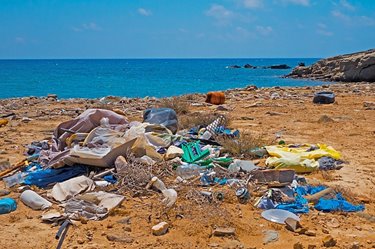Plastic Pollution Solutions
Ocean First Jul 06, 2022

 Plastic pollution has far surpassed the point in which we can feign ignorance and not act. It is a worldwide problem and we need to address it now. Most often, plastic is produced, used, and then simply discarded, with studies showing that 91% of all plastic is not recycled. Up to 8.8 million U.S. tons of plastic ends up in the ocean every year, where it is not only harming marine life, but also ending up in our food. At our rate, by 2050 “the oceans will contain more plastic waste than fish, ton for ton.” Our plastic problem also adds to our dependency on fossil fuels and contributes to climate change. Reusing or recycling more will help address this, but these are just temporary patches for a problem that is bursting at the seams. In order to address the plastic pollution problem at its root, we need to reduce our use of plastic entirely and develop alternative solutions. Something needs to change and fast.
Plastic pollution has far surpassed the point in which we can feign ignorance and not act. It is a worldwide problem and we need to address it now. Most often, plastic is produced, used, and then simply discarded, with studies showing that 91% of all plastic is not recycled. Up to 8.8 million U.S. tons of plastic ends up in the ocean every year, where it is not only harming marine life, but also ending up in our food. At our rate, by 2050 “the oceans will contain more plastic waste than fish, ton for ton.” Our plastic problem also adds to our dependency on fossil fuels and contributes to climate change. Reusing or recycling more will help address this, but these are just temporary patches for a problem that is bursting at the seams. In order to address the plastic pollution problem at its root, we need to reduce our use of plastic entirely and develop alternative solutions. Something needs to change and fast.
Reduce, Reuse, Recycle. We see this phrase all around us, but the emphasis is often placed on “recycle” while the other two are typically forgotten. Placing an item in the recycling bin doesn’t necessarily mean that it is going to be recycled as different materials require different recycling infrastructure. A New York Times article published in May 2018 discusses how the U.S. relied heavily on outsourcing its recycling to countries such as China, which up until last year processed up to half of the world’s plastic and paper recycling. As part of an incentive to decrease pollution, China implemented a ban in 2018 that stated they were no longer importing mixed paper and residential plastics for recycling. This ban continues to grow, with limitations on scrap metal starting July 1, and China aims to stop accepting all scrap materials by 2020. With China no longer recycling the world’s waste, it is time to develop the capacity to process our own waste in an environmentally sustainable manner.
As one of the largest non-profit recyclers in the U.S., Boulder-based Eco-Cycle produces guidelines on how to recycle, compost and lead an eco-friendly lifestyle. They are an amazing resource to find out how you can get rid of that old yoga mat or broken coffee machine. On a larger scale, organizations such as Closed Loop Fund are working towards creating alternatives by helping companies innovate and grow towards the development of a sustainable circular economy where “materials are shared, re-used, and continuously cycled.” Funded through investments from large retail and consumer goods companies such as Amazon, Starbucks, and Coca-Cola, the Closed Loop Fund invests in developing and building recycling infrastructure that increases recycling rates and ensures recycled materials are used in domestic products and packaging. Momentum Recycling received financing from the Closed Loop Fund to open a glass recycling plant in Broomfield in 2015 and increased Colorado’s glass recycling rate from 6.25% to 21.65%.
 Every action matters, no matter how small. Those individual actions compound, inspire others, and lead to change. While the switch to using plastic alternatives can seem overwhelming, you can always try by starting small with what comes easiest to you and go from there. Changes such as switching to reusable shopping bags and water bottles are great starting points as they only require small adjustments by creating new habits to ensure their use. While actively trying to recycle is better than placing everything straight in the garbage, the alternatives of reducing and reusing have the advantage of not risking the production of any plastic pollution. As global awareness of the plastic pollution problem grows, it is becoming easier to research ideas and options for how any individual can make the change to a reduced-plastic lifestyle.
Every action matters, no matter how small. Those individual actions compound, inspire others, and lead to change. While the switch to using plastic alternatives can seem overwhelming, you can always try by starting small with what comes easiest to you and go from there. Changes such as switching to reusable shopping bags and water bottles are great starting points as they only require small adjustments by creating new habits to ensure their use. While actively trying to recycle is better than placing everything straight in the garbage, the alternatives of reducing and reusing have the advantage of not risking the production of any plastic pollution. As global awareness of the plastic pollution problem grows, it is becoming easier to research ideas and options for how any individual can make the change to a reduced-plastic lifestyle.
For those in Boulder, we recommend checking out Refill Revolution, a brick & mortar and online store with products to facilitate low-waste lifestyles. Another highly recommended Boulder-based store is EarthHero, an online marketplace with the goal of making “sustainable, earth-friendly commerce the new normal.” All their products have been characterized by “sustainability features” which give information about the materials, manufacturing and business processes that go into each product. Denver-based ZERO market also focuses on fostering zero-waste lifestyles and are working to open a food-based market that will have package-free local produce and bulk food.
Boulder is a leader in the U.S. sustainability scene, with only 49% of our waste sent to landfills and goals of becoming a zero-waste city by 2025, joining a cohort of other large cities including the Big Apple with lofty goals of also becoming zero-waste cities in the near future. With those pledges comes pressure on businesses to make similar commitments. UN Environment published an article in June 2018 discussing businesses that have made pledges varying from decreasing single-use plastics to using more recycled materials in their packaging and products. National Geographic has been keeping a running list as more and more cities, countries and companies are addressing the plastic pollution problem.
 Groups such as The New Plastics Economy and the Plastic Pollution Coalition bring people who want to address the plastic pollution problem together to work to develop alternatives, as well as support the creation of circular economies to stop the production of new plastic. One of the difficulties of replacing plastic, discussed in an article from January 2019, is that “plastic is a light-weight, durable and relatively cheap to produce material” and that alternatives tend to be more expensive and harder to produce at a large scale. While this makes it a challenge to move away from plastics, there are companies out there who are looking for solutions. Smaller-scale bioplastic alternatives are being developed in many different industries, such as Pela, who makes compostable smartphone cases, and Evoware, who makes zero-waste and seaweed-based food packaging.
Groups such as The New Plastics Economy and the Plastic Pollution Coalition bring people who want to address the plastic pollution problem together to work to develop alternatives, as well as support the creation of circular economies to stop the production of new plastic. One of the difficulties of replacing plastic, discussed in an article from January 2019, is that “plastic is a light-weight, durable and relatively cheap to produce material” and that alternatives tend to be more expensive and harder to produce at a large scale. While this makes it a challenge to move away from plastics, there are companies out there who are looking for solutions. Smaller-scale bioplastic alternatives are being developed in many different industries, such as Pela, who makes compostable smartphone cases, and Evoware, who makes zero-waste and seaweed-based food packaging.
The future of a world without plastic is on the horizon. The Ocean Plastic Innovation Challenge was announced by National Geographic on February 11th “to source ideas from around the world about how to address plastic waste.” Challenge One asks for the innovation of plastic packaging alternatives, Challenge Two is looking for creative zero-waste business models, and Challenge Three wants to reframe the plastic problem to find a new way to present it that addresses its immense scale as well as all of the things humanity is doing to try and fix it.
So, what are you going to do?
For those interested in more in-depth information: UN Environment May 2018 Report - Exploring the potential for adopting alternative materials to reduce marine plastic litter
